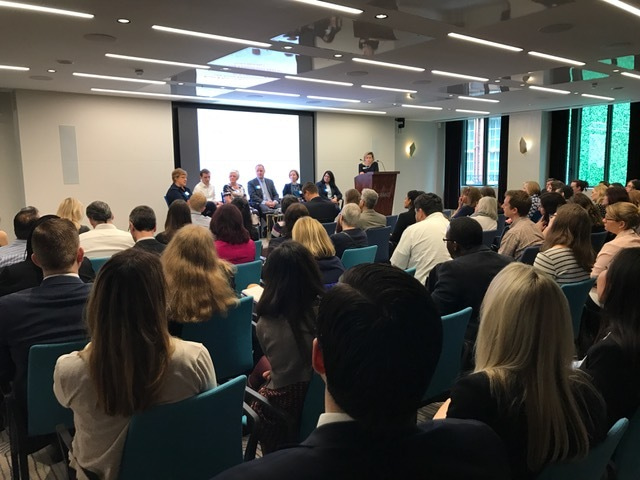These changes can present huge challenges for business and particularly for global mobility. So FEM’s London Chapter invited a panel of experts to discuss how organisations can anticipate and manage the consequences of so much upheaval.
KPMG kindly hosted the event at their exclusive Members’ Club in Grosvenor Street, Mayfair and more than 75 professionals from a wide range of industry sectors attended.
Our distinguished panel
Our expert panel members provided the audience with diverse and distinct perspectives on the issues: Anastassia Beliakova, Senior Trade Policy Manager at British Chambers of Commerce, which represents over 75,000 businesses across the UK shared some of the key findings of the BCC’s Business Brexit Priorities report. Punam Birly, Partner at KPMG UK, who leads the KPMG Legal Services in their Employment and Immigration Practice was joined by her colleague, Chris Hogan, Tax Partner at KPMG, who flew in specially from his base in Zurich. They were joined by Ian Robinson, Partner at Fragomen in London, where he also leads the firm’s UK Government Strategies Practice as well as representatives of two leading FTSE 100 companies, Viv Mott, Head of Global Mobility at Aviva and Helen Walton, Director of Global Mobility at Astra Zeneca.
Beyond Brexit
Though the discussion initially centred on Brexit and its possible consequences, the talk also ranged across the latest changes to tax, immigration and trade policy in the USA under the new Trump Administration as well as the abolition of Australia’s 457 visa. Chris Hogan, a native New Yorker was able to share his knowledge of the US tax system and Donald Trump’s proposed new changes to both corporation and personal tax, and Punam Birly, in addition to explaining a number of changes to immigration regulations worldwide, also highlighted the implications for social security policies.
Positive steps
There was certainly no shortage of challenges to be addressed, but the panel also shared some ideas for creative solutions. Viv Mott and Helen Walton discussed the ways in which they have dealt with Brexit so far. Viv explained how, in the immediate aftermath of the widely unexpected referendum result, Aviva embarked on a Right to Work check of over 18,000 employees.
Both Helen and Viv reported that the measures that both companies have undertaken so far have also yielded some other, unintended, but useful results, so the message was very much that organisations need to assess their situation as soon as possible and run checks on their compliance. Both emphasised that it is important to put in place plans in case the UK’s final deal with the EU turns out to be less favourable to business than the government hopes.
Time to reassess?
Before moving to Fragomen, Ian Robinson previously worked in a very senior role at the Home Office for eight years, and he shared some crucial insight into how policy is formulated, not just in the UK, but in other countries that are in dialogue with the British authorities. Ian also made an interesting suggestion that if the UK does experience skills and labour shortages as a result of Brexit, it may be time for organisations to reassess the diversity of their workforce and look at more flexible employment contracts, to encourage returning women and older workers, and retrain other, under-used personnel such as ex-offenders. This is an issue we’ll be exploring in more detail at our July London Chapter meeting: Mind the Gap - Dealing with the gender and generation gaps in global mobility – the details of which will be announced very soon.







Please sign in or register for FREE
If you are a registered user on The Forum for Expatriate Management, please sign in